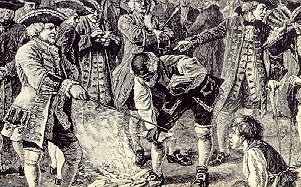< Previous Page * Next Page >
Clear as was the need, from the British standpoint, for a new imperial pattern, the situation in America was anything but favorable to a change. Long accustomed to a large degree of independence, the colonies were at a stage in their development where they demanded more, not less, freedom, particularly since the French menace had been eliminated. To put a new system into effect, to tighten control, the statesmen of England had to contend with colonists trained to self government and impatient of interference, with self-reliant and enterprising merchants, politically conscious mechanics, planters proudly refractory to imperial discipline, yeomen of the uplands who knew little and cared less for laws and regulations of the empire, and with colonial assemblies sensitive to infringements on what they regarded as their constituents' rights. Indeed, many Americans cared not a whit for the British Empire as such. All but a small minority were aggressively determined to go their own ways and live their own lives in the America they had converted from a wilderness to a home.

One of the first problems tackled by the British was that of organizing the interior. The conquest of Canada and of the Ohio Valley imposed upon Britain the task of devising a governmental structure and a land and religious policy which would not alienate the French or Indian inhabitants. But here she came into conflict with the interests of the seaboard colonies which, fast increasing in population, were bent upon exploiting the newly won territories themselves. Needing new land, various colonies, on the basis of their charters, claimed the right to an extension as far west as the Mississippi River. Feeling that the recently conquered region belonged to them, people poured across the mountain passes in an ever increasing stream. But the British government feared that if pioneer farmers crowded into the new land they would provoke a series of Indian wars. They felt that the restive Indians should be given time to settle down and that lands could be opened to colonists on a more gradual basis. In 1763, consequently, a royal proclamation reserved all the western territory between the Alleghenies, the Floridas, the Mississippi, and Quebec for the use of the Indians. Thus at one stroke the Crown attempted to sweep away every western land claim of the thirteen colonies and to stop westward expansion in the same way that it had been threatened by the earlier French occupation. Though never effectively enforced, to indignant colonists this measure constituted a high-handed disregard of their most elementary right, the right to occupy and utilize western lands as needed.

More serious in its repercussions was the new financial policy of the British. To support the increased empire required money, and unless the taxpayer in England was to supply it all, the colonies would have to contribute. But revenue could be extracted from the colonies only through a stronger central administration, and this could be achieved only at the expense of colonial self-government. The first step in inaugurating the new system was the passage of the Sugar Act of 1764. This act, as amended two years later, had the raising of revenue as its sole purpose. It was not concerned with regulating trade as such. As a matter of fact it replaced a trade-regulations measure. The Molasses Act of 1733 had placed a prohibitive duty on the import of molasses from non-English areas. The amended Sugar Act simply put a modest duty on molasses from all sources. The act also levied duties on wines, silks, coffee, and a number of other luxury items. To enforce it, customs officials were ordered to show more energy and strictness. British war ships in American waters were instructed to seize smugglers, and "writs of assistance" (i.e. blanket warrants) were authorized to enable the King's officers to search suspected premises.
< Previous Page * Next Page >